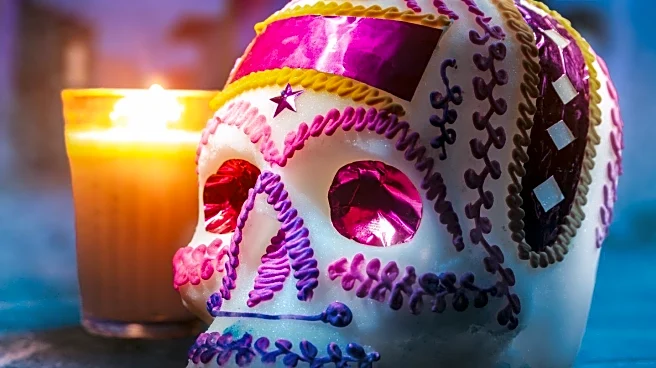What's Happening?
The article delves into the personal reflections of Fidel Martinez, who shares his experiences of fatherhood and grief during the Dia de Muertos season. Martinez describes a morning ritual with his daughter,
where they greet photos of his late father, fostering a connection between the child and her grandfather. This practice is part of Martinez's effort to keep his father's memory alive and integrate it into his daughter's life. The narrative highlights the cultural significance of Dia de Muertos, a time when many in the Latinx community honor their deceased loved ones. Martinez's story is a poignant example of how personal loss and cultural traditions intersect, providing a framework for processing grief and celebrating familial bonds.
Why It's Important?
This narrative underscores the broader cultural importance of Dia de Muertos within the Latinx community in the United States. The holiday offers a culturally sanctioned space to discuss death, a topic often considered taboo in American society. By sharing personal stories, individuals like Martinez contribute to a collective understanding of heritage and identity. The growing popularity of Dia de Muertos in the U.S. reflects a shift towards embracing diverse cultural practices and narratives. This trend not only enriches the cultural tapestry of the nation but also provides a platform for minority communities to express and preserve their traditions. The story also highlights the role of storytelling in maintaining cultural continuity and personal healing.
What's Next?
As Dia de Muertos continues to gain recognition in the U.S., there may be increased opportunities for cultural exchange and education. Events like the digital altar project by the Los Angeles Times offer a modern twist on traditional practices, allowing broader participation and understanding. Such initiatives could lead to more inclusive celebrations and a deeper appreciation of Latinx cultural contributions. Additionally, as more individuals share their personal narratives, there may be a growing dialogue around the themes of loss, memory, and identity, fostering greater empathy and connection across diverse communities.
Beyond the Headlines
The story touches on the universal human experience of grief and the ways in which cultural practices can aid in processing loss. It raises questions about how different cultures approach death and remembrance, and the potential for these practices to offer comfort and continuity. The narrative also suggests a broader societal shift towards valuing diverse cultural expressions, which could influence public policy and community engagement strategies. As the U.S. becomes increasingly multicultural, understanding and integrating these diverse perspectives will be crucial in shaping a more inclusive society.









